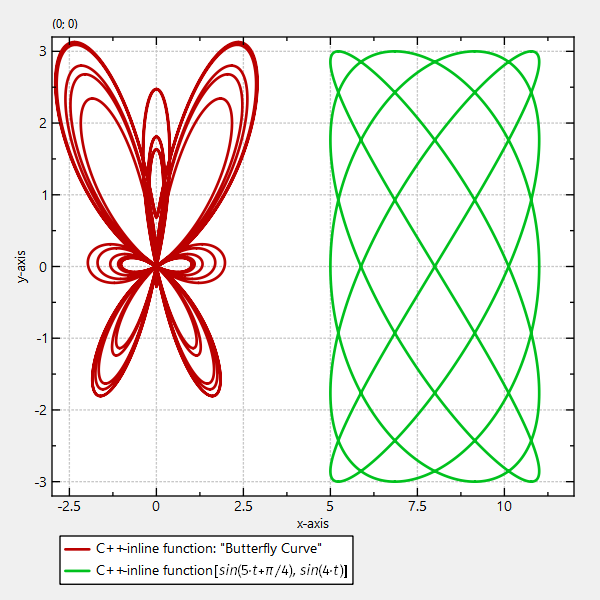| .. | ||
| CMakeLists.txt | ||
| evalcurve_and_lib.pro | ||
| evalcurve.cpp | ||
| evalcurve.pro | ||
| README.md | ||
Example (JKQTPlotter): Plotting Parametric Mathematical Curves as Line Graphs
Basics
This project (see ./examples/evalcurve/) demonstrates how to plot mathematical functions as line graphs. The functions may be defined as static C functions, C++ functors or c++ inline functions.
[TOC]
Simple C++ inline function
The example shows how to plot a simple C++ inline function:
JKQTPXYFunctionLineGraph* func1=new JKQTPXYFunctionLineGraph(plot);
func1->setPlotFunctionFunctor([](double t) -> QPointF {
const double a=5;
const double b=4;
const double delta=JKQTPSTATISTICS_PI/4.0;
return QPointF(sin(a*t+delta), sin(b*t));
});
func1->setTRange(0, 2.0*JKQTPSTATISTICS_PI);
func1->setTitle("C++-inline function $[ sin(5{\\cdot}t+\\pi/4), sin(4{\\cdot}t) ]$");
plot->addGraph(func1);
Note that here a functor is defined, which calculates the points on a Lissajous Curve, i.e. a function mapping a parameter t to a two-dimensional point QPointF with x=sin(a*t+delta)and y=sin(b*t). This function is evaluated on a range of values for t, set by
func1->setTRange(0, 2.0*JKQTPSTATISTICS_PI);
The class uses an adaptive algorithm, which determines by the local slope, at how many points (or how close points) the functor has to be evaluated.
Screenshot
This code snippets above result in a plot like this:
Notes
Just as shown in examples/functionplot for JKQTPXFunctionLineGraph and JKQTPYFunctionLineGraph, different types of functions can be used to plot. Either simple C++ inline functions, that take a double t and return a QPointF, or functions that additionally take a parameter vector void* params. In that case, the parameters may be provided from different sources, as described in examples/functionplot .
